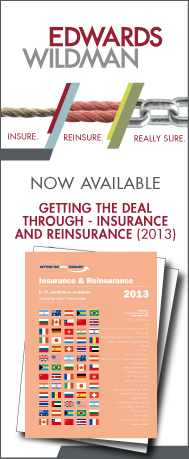 |
|
| edwardswildman.com | |
Reinsurers Pressed for Compliance with Iran Sanctions by Nick Pearson (New York) and John Fusco (Stamford) The U.S. government administers and enforces economic sanctions programs primarily against countries and groups of individuals such as terrorists, through either comprehensive or selective action, using the blocking of assets and trade restrictions to accomplish its foreign policy and national security goals. Due to Iran’s support for international terrorism and its aggressive action against international shipping in the Persian Gulf, the U.S. has imposed a trade embargo on Iran for more than 30 years. In general, unless licensed by the U.S. Treasury, Office of Foreign Assets Control (OFAC), no U.S. person, wherever located, may sell, supply, export or have re-exported on their behalf, any goods, technology or services to Iran or to the Government of Iran. Over time the embargo imposed on Iran has expanded to include a more comprehensive ban on financial transactions involving the Government of Iran, or banking and other financial transactions involving persons in Iran in order to restrict or bar Iranian financial institutions from accessing the international financial system. As part of this effort, The National Defense Authorization Act for Fiscal Year 2013 (signed January 2, 2013 and effective July 1, 2013) includes a subtitle, the “Iran Freedom and Counter-Proliferation Act of 2012”(IFCPA). IFCPA expands the reach of U.S. sanctions against Iran to include several new sectors and activities. This expanded ban includes prohibitions on insurance, reinsurance and underwriting activities. Compliance with the sanctions program is mandatory under U.S. Federal law, but in an interesting twist, the New York Department of Financial Services (“DFS”) has put all certified and accredited reinsurers in New York on notice that compliance with the latest set of U.S. government Iranian sanctions is expected and has specifically asked the reinsurers for indicia of compliance. The DFS’ jurisdiction for this unusual effort at state enforcement of Federal law purports to lie in New York’s authority to regulate the solvency and conduct of its domestic insurance market, and violations of the federal sanctions program could result in crippling fines against insurers or reinsurers doing business in New York, or their being precluded altogether from doing any business in the U.S. In particular the IFCPA imposes sanctions on any person that has knowingly provided underwriting services, insurance or reinsurance for 1) any activity with respect to Iran that has been sanctioned under U.S. Law including the IFCPA, 2) or to any person with respect to or for the benefit of, any activity in the energy, shipping, or shipbuilding sectors of Iran that are subject to U.S. sanctions under U.S. Law, 3) insuring, or reinsuring, the sale of goods to Iran (such as, raw or finished metals, coal, software, aerospace component parts to name a few), or 4) providing underwriting, insurance or reinsurance to or for the benefit any Iranian person included on the U.S. Treasury’s Office of Foreign Assets Control (OFAC) list.1 There are limited exceptions to insuring, reinsuring or underwriting sanctioned activities. Transactions for the sale of agricultural commodities, food, medicine or medical devices to Iran, or for the provision of humanitarian assistance to the people of Iran may be insured, reinsured, or underwritten without violating the IFCPA. The exemption in the IFCPA notes that sanctions will not be imposed on an entity that provides insurance, reinsurance or underwriting services, if it is determined “that the person has exercised due diligence in establishing and enforcing official policies, procedures, and controls to ensure that the person does not underwrite or enter into a contract to provide insurance or reinsurance for an activity described … in the IFCPA.2 Sanctions for violating the IFCPA are extensive and utilize many methods to discourage trade with Iran. Financial entities found to be in violation of the IFCPA may be prohibited from engaging in foreign exchange, prohibited from entering into banking transactions including, transfers of credit or payments between financial institutions or by, through or to any financial institution, to the extent that such transfers or payments are subject to the jurisdiction of the United States and involve any interest of the sanctioned person. Additionally, the sanctions include the authorization for the United States Treasury to block all property and interests of a person or financial entity found to be in violation of the IFCPA.3 The net effect of the sanctions will prevent an insurer from transacting business in the United States. To avoid violations of the IFCPA reinsurers must have a compliance program in place setting forth the reinsurer’s internal policies to be followed by all employees. An effective compliance program must be in writing, describing the multistep program that is followed at each stage of the underwriting process and throughout the term of the insurance contract. During the initial underwriting process, all parties to the insurance contract must be screened against OFAC’s Specially Designated Nationals (SDN) list. The screening of existing policies should occur at regular intervals to ensure that existing policy holders have not been added to the SDN list. (This list includes individuals beyond Iranian Nationals whose assets are blocked, and U.S. persons are generally prohibited from dealing with them). As regular screening of existing policies may result in the discovery of a party being added to the SDN list after the issuance of the policy, the compliance program must have a procedure to handle insurance contracts or claims made by individuals added to the SDN list after the insurance contract was written. In some situations, it is possible to obtain a license from OFAC to allow the receipt of payments to keep the policy in force. However, while it is unlikely that a payment under the policy would be licensed to an individual or entity on the SDN list, it is possible that a payment would be allowed to an innocent third party who is a beneficiary of a policy owned and covering an individual or entity on the SDN list. Finally, the compliance program must have the steps necessary to file any required disclosures to the appropriate authority when a violation of the IFCPA is discovered by the reinsurer. It is not clear from the language of the IFCPA whether the inclusion of limitations on the payment of insurance proceeds that violate U.S. law is now sufficient. Sanction Clauses in policies should be reviewed and consideration given to include language that insurance policies covering transactions found to be in violation of the IFCPA or any U.S. economic or trade sanctions are void ab initio. Due to the reach of the IFCPA, its mandatory nature, and New York’s and perhaps other states’ heightened interest in insurer compliance, now is the time to review existing compliance programs and implement provisions to avoid potential violation of the IFCPA. Insurers should audit current lines of business that they or affiliated entities provide, to determine if current lines of business expose the insurer to sanctions under the IFCPA.
ENDNOTES
1 IFCPA §1246 2 IFCPA§1246 (d) 3 IFCPA§1256 (a) 1(A),Iran Sanctions Act of 1996 50 U.S.C. §1701 note, Executive Order 13645, June 3, 2013 Contact
| |
 |
|


